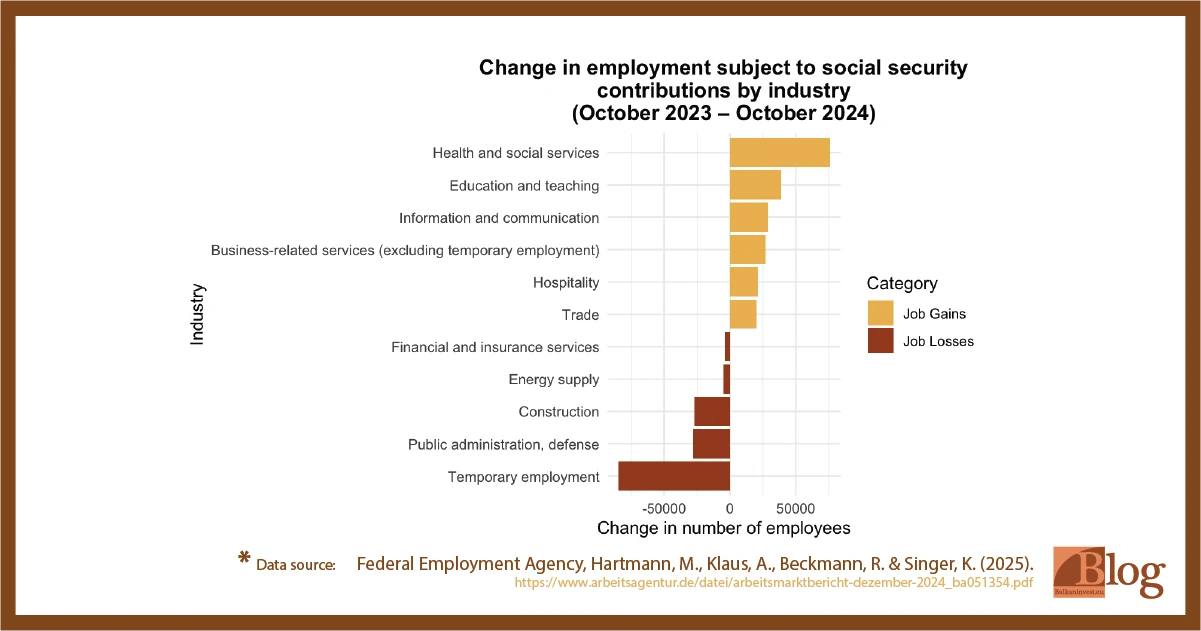
Skilled worker immigration to Germany: Bulgaria as a strategic talent pool
Germany’s economy faces a key challenge: an acute shortage of skilled workers, which is a significant obstacle to growth. To counteract this, the federal government has enacted the Skilled Immigration Act (in force since 2023), which aims to facilitate access to international talent. In this context, Bulgaria is emerging as a strategic talent pool. Thanks to its EU membership and the availability of qualified skilled workers, many of whom have German language skills, the country offers significant potential for Germany. Strategic management of this immigration is crucial to fully exploit this potential.

Germany’s acute shortage of skilled workers
The German labor market is experiencing significant skills shortages in numerous sectors. In April 2025, a large number of job vacancies were reported to the Federal Employment Agency (BA). Particularly affected are professions in childcare and education, where there are over 21,000 vacancies and an additional shortage of around 300,000 childcare places for children under the age of three. Social work and social education experts are also urgently sought after, with over 18,000 vacancies in areas such as career guidance, child and youth facilities, and school social work. There is also a large shortage of over 18,000 positions in the health and nursing care sector, including geriatric care and physiotherapy. Skilled trades in the electrical and construction sectors are also in high demand, with delays in construction projects attributable to the shortage of skilled workers. In addition, around 8,000 skilled workers are needed in mechanical engineering.

*Data source: Federal Employment Agency. (2025). Statistics/Labor Market Reporting – statistik.arbeitsagentur.de
The ten most sought-after professions in Germany include software developers, electronics technicians, healthcare and nursing professionals, IT consultants, economists, customer service representatives, production assistants, sales representatives, sales managers, and architects/civil engineers. In 2025, there will be an overall decline in demand for skilled workers, but this does not mean that the shortage of skilled workers will be resolved. While some industries are experiencing job losses, such as manufacturing (-94,000 jobs) and temporary work (-72,000 workers), other sectors are growing strongly. In particular, 45,000 new jobs were created in healthcare, 57,000 in nursing and social services, 51,000 in public services, 93,000 in education and teaching, and in skilled business services, transport and logistics, finance and insurance, and mining/energy/water/waste disposal.

*Data source: Federal Employment Agency, Hartmann, M., Klaus, A., Beckmann, R. & Singer, K. (2025). – arbeitsagentur.de
Another worrying trend is the increase in the proportion of people aged 20 to 34 without formal qualifications, which rose by 3 percentage points to 13 percent between 2013 and 2024.
Bulgaria: Between brain drain and talent pool
Bulgaria is one of the countries particularly affected by brain drain. Since 1990, the country has experienced a significant decline in population, driven largely by emigration due to economic disparities within the EU. Bulgarians seek higher wages, better job security, and improved living conditions in Western Europe. Internal problems such as corruption and weak public services also contribute to emigration.

*Data source: World Economic Outlook (WEO) Database. (2025, April 22). IMF. – www.imf.org
The brain drain has a serious impact on Bulgaria, as it leads to a decline in human capital and slows economic growth. Sectors such as healthcare are particularly affected by the loss of skilled workers.

*Data source: World Population Prospects. (n.d.). – ec.europa.eu
For a comprehensive and detailed analysis of brain drain in Bulgaria, including specific figures, precise causes, and effects on individual sectors, see also Labor Migration in the EU: Bulgaria between Brain Drain and Brain.
Germany benefits greatly from the brain drain in Bulgaria, as it is the preferred destination for Bulgarian migrants. In 2024, 371,128 Bulgarian citizens were living in Germany, many of whom are above average in terms of education. Immigration from Eastern European countries has slowed demographic change in Germany and helped to secure a supply of skilled workers.
The Bulgarian education system offers practical knowledge and issues internationally recognized diplomas. German is the second most commonly learned and taught foreign language in Bulgarian schools, which facilitates integration into the German labor market.
Legal framework and simplifications
The new Skilled Immigration Act and, in particular, the new EU Blue Card (since November 2023) make it much easier for skilled workers to immigrate. The salary thresholds for the EU Blue Card have been significantly lowered, and the group of people who can obtain it has been expanded to include IT specialists without a university degree under certain conditions.
The list of shortage occupations for the EU Blue Card has been greatly expanded and now includes, in addition to mathematics, computer science, natural sciences, engineering, and human medicine, numerous other occupations such as managers in various fields, veterinarians, dentists, pharmacists, and teachers.
In addition, short-term and long-term mobility has been simplified for holders of an EU Blue Card from other EU member states. Family reunification has been given preferential treatment, and the regulations on employment and recognition have been improved. The introduction of the recognition partnership enables skilled workers with foreign professional qualifications to go through the recognition process only after entering Germany.
Conclusion and outlook
Bulgaria faces the complex task of stemming the ongoing brain drain while at the same time harnessing the potential of return migration. The phenomenon of brain drain is directly attributable to socioeconomic imbalances within the EU. A holistic approach that includes measures to curb brain drain and promote brain gain is crucial and requires cooperation between politics, business, the education system, and civil society in Bulgaria, as well as dialogue between immigration and emigration countries.
Bulgaria faces the complex task of stemming the ongoing brain drain while at the same time harnessing the potential of return migration. The phenomenon of brain drain is directly attributable to socio-economic imbalances within the EU. A holistic approach that includes measures to curb brain drain and promote brain gain is crucial and requires cooperation between politics, business, the education system, and civil society in Bulgaria, as well as dialogue between immigration and emigration countries.

